Inside: Learn how to start decluttering your home using these helpful decluttering tips!
Are you feeling overwhelmed by the sheer amount of stuff in your house?
Do you feel like clutter has totally taken over your space – and you aren’t sure where to even begin decluttering?
Decluttering and organizing your home might seem like a daunting task, but you’ll be amazed to see just how much better you feel once the job is done.
Clutter can actually have a negative impact on our mental wellbeing, and it’s easy to see why.
Clutter causes needless stress, anxiety, and overwhelm. Not to mention, a cluttered home is the opposite of a calm and relaxing home aesthetic.
In some situations, clutter can get so bad that it interferes with your ability to truly live in your home.
While figuring out how to start decluttering your house might feel even more overwhelming at first than simply living among your clutter, once the job is done, you’ll be glad that you did.

What is clutter and how does it affect your life?
Clutter is defined as “a collection of things lying about in an untidy mess,” and that’s about as accurate as it gets.
Clutter can be books and magazines, toys and games, sculptures and vases – basically anything that could be left out of place and considered unorganized.
Almost all of us have some kind of clutter in our homes. Whether it’s a kitchen counter that’s covered in stuff, a desk drawer that’s become a dumping ground for old mail and things that don’t have a home, or a child’s playroom that’s simply overflowing with too many toys.
Odds are high that you can find at least one spot that isn’t well-organized. While clutter might be the norm, that doesn’t mean it’s a good thing. In fact, clutter can affect your life – and not in a positive way.
The mental and emotional impact of clutter
Your environment has an impact on your mental and emotional state. If your environment is cluttered, you might be suffering from some consequences.
Clutter is known to trigger anxiety. The visual distraction created by clutter can make it difficult to focus, which can lead to increased stress.
Clutter can even make it difficult to rest, relax, and sleep – and the impacts of poor sleep are far-reaching on our physical and mental health.

Where to Start Decluttering?
It’s clear to see that decluttering brings many benefits to your health, wellbeing, and physical space.
But how do you start decluttering?
It’s a question so overwhelming that it stops many people in their tracks and keeps them from ever truly decluttering and organizing. But while it is a big question, it isn’t an impossible one.
The best place to start decluttering is with a plan.
Use a decluttering checklist to keep you on track and reduce anxiety.
If you aren’t sure how to start decluttering your house, a checklist can be an excellent tool to help.
My free Decluttering Jumpstart Checklist is a great place to start when it comes to making a plan to tackle your clutter – and you can, of course, always create your own!
How to Declutter Your Home, Room by Room
While this won’t be an exhaustive plan for decluttering every type of item in your home, these tips offer a great way to start decluttering your house.
Focusing on one room and then one space within that room at a time will help the process to feel much less overwhelming.
Some people find it helpful to set a timer for ten or fifteen minutes to see how much they can get done. Try it. The results may surprise you.
And often after that time is up, you may be motivated to restart the timer and do another round of decluttering. The pace at which you choose to go will depend on the time and energy that you have available to devote to it.
Keep in mind that clutter is taking your time regardless, so making the decision to proactively deal with it will pay off in the long run.
You also don’t have to declutter the rooms in the order they are listed. Start with one that you think can be an easier win for you. Now, let’s get started!

How to Declutter Your Bedroom & Create a Relaxing Sanctuary
The bedroom is an easy space for clutter to accumulate for a few reasons. Aside from sleeping, most people don’t spend too much time there.
On top of that, it’s a space that most people generally don’t show off to visitors – which means it’s an easy place to hide clutter.
Here’s how to begin decluttering your bedroom to create a relaxing sanctuary:
Purge your closet and dresser drawers.
Get rid of socks that don’t have a match, things that no longer fit, and anything else you don’t need to keep.
Tackle your nightstand.
Bedside tables have a tendency to accumulate clutter. Figure out what doesn’t belong there and find appropriate homes for them.
Evaluate your bed.
Do you have too many pillows? Too many blankets? If you’re taking half of them off the bed before you sleep, it might be a sign it’s time to get rid of them entirely.
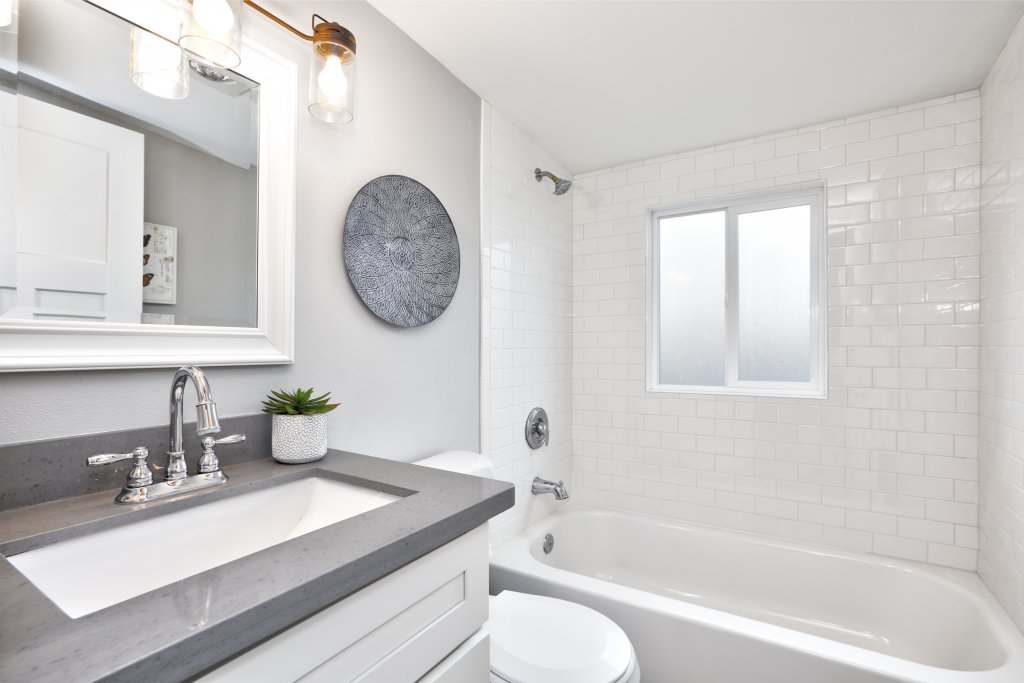
How to Declutter Bathroom & Have Just the Essentials
The bathroom is another hot spot for clutter. Drawers and cabinets make it easy to keep clutter out of sight and out of mind, and bathroom counters can quickly become overwhelmed – especially in a shared space.
Here’s how to begin decluttering your bathroom:
Clean out cabinets and drawers.
Chances are, you’ll find expired medication, old makeup, and plenty of other stuff you won’t actually use again.
Take care of your countertops.
Keeping lots of stuff on your bathroom counter is sure to make the space feel cluttered. And after you clean out those cabinets and drawers, you should have a little extra space to hide away some of that stuff.
Keep the essentials.
As you declutter the bathroom, focus on the essentials that you use regularly. This perspective shift of keeping your mind on the things you love can make it easier to let go of the things that aren’t getting used.
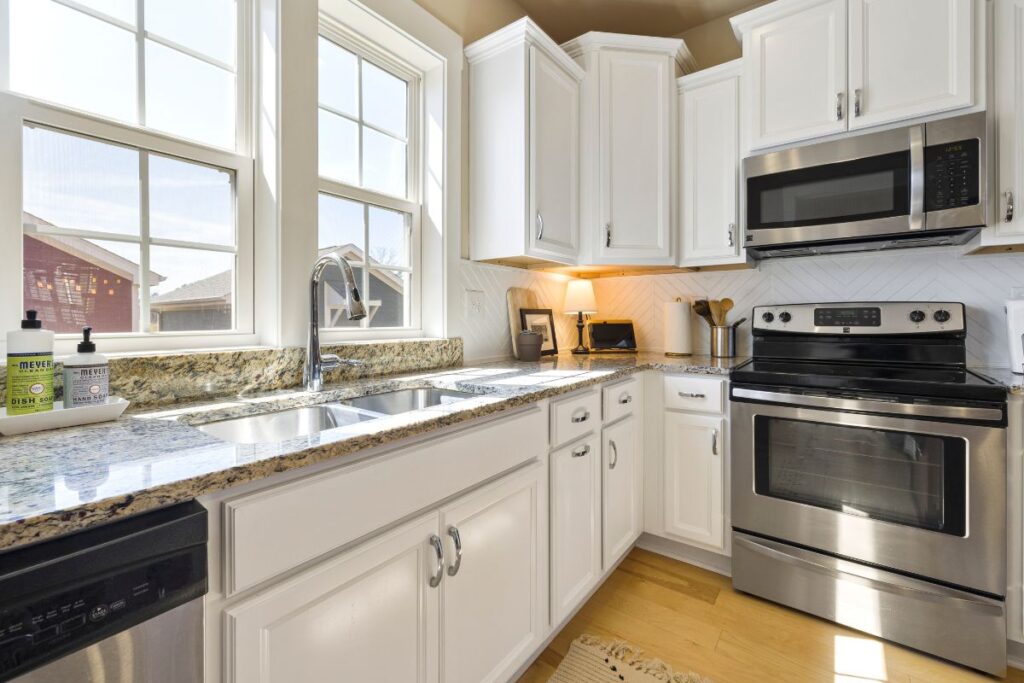
How to Begin Decluttering Your Kitchen & Keep Your Countertops Clear
Whether or not you enjoy cooking, the kitchen can easily become a spot where clutter accumulates. Lots of counter space means lots of room to let clutter grow.
Sometimes, that clutter actually belongs in the kitchen – spices, utensils, cutting boards, and small appliances that take up lots of space but don’t see much use.
Other times, that clutter involves things like keys, mail, books, water bottles, and random stuff that shouldn’t even be in the kitchen.
Here’s how to begin decluttering your kitchen and give yourself the peace of mind clear countertops bring:
Sort through your cabinets and drawers.
Make space for storage by getting rid of anything that needs to go, like expired spices, chipped dishes, and Tupperware lids without containers.
Clear those countertops!
Find storage spaces for anything that doesn’t truly need to be kept out in the open. Toasters, blenders, dish drying racks, and other bulky countertop stuff can be kept elsewhere and brought out when needed.
You’ll love the feeling of having clearer countertops!
Purge your pantry.
If you have a pantry when was the last time you really audited what’s inside? Pull everything out, check those expiration dates, and get rid of stuff that’s past its prime.
And for the rest, ask yourself if you’re really going to eat that. If not, donate it to a local food bank or to your local Buy Nothing group.
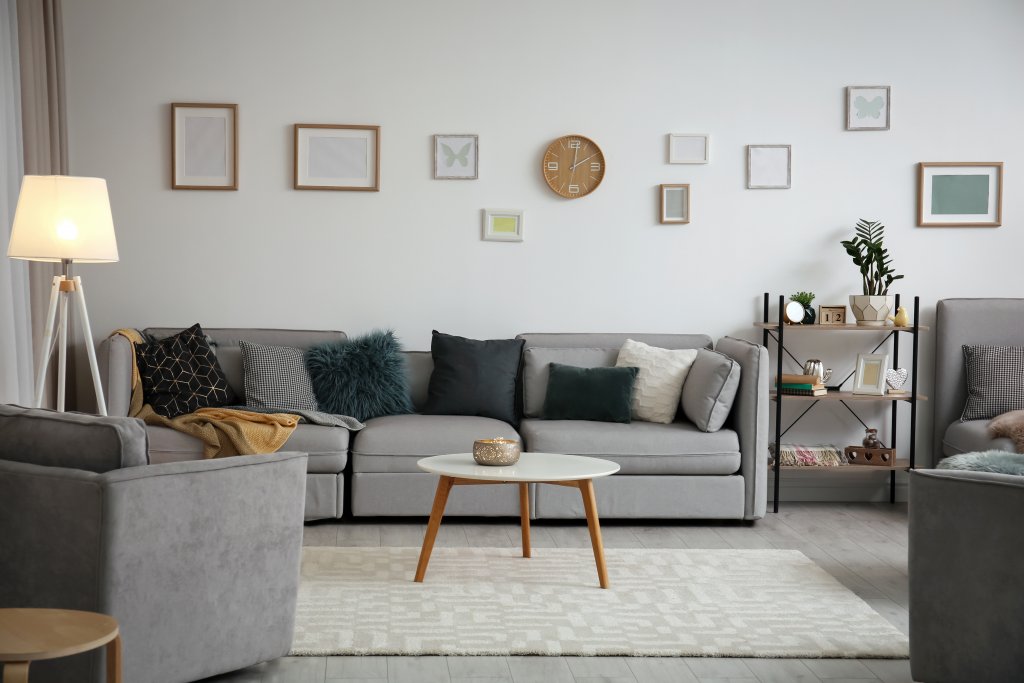
How To Declutter Your Living Room & Make It a Space You Love
The living room is the heart of many homes. With so many family members passing through and spending time in this space, clutter can quickly accumulate.
Fortunately, with a little effort, you can take care of that clutter and transform your living room into an organized space that you love.
Here’s how to begin decluttering your living room:
Clean up that coffee table.
If your coffee table has become a hotspot for clutter, clear it off. If it’s one that comes with storage, check that, too.
Clear out general clutter.
Is there stuff on the floor? Stuff on the couch? Things shoved on shelves that doesn’t belong? Start from one corner of the room and work your way around, tackling the clutter that crosses your path.
Evaluate your media collection.
If you keep shelves filled with DVDs or BluRays in your living room, you may want to consider paring down your collection.
Keep your favorites and sell or donate the ones you won’t watch again. With everything available through the cloud, you don’t really need to keep as many physical copies of movies or albums.
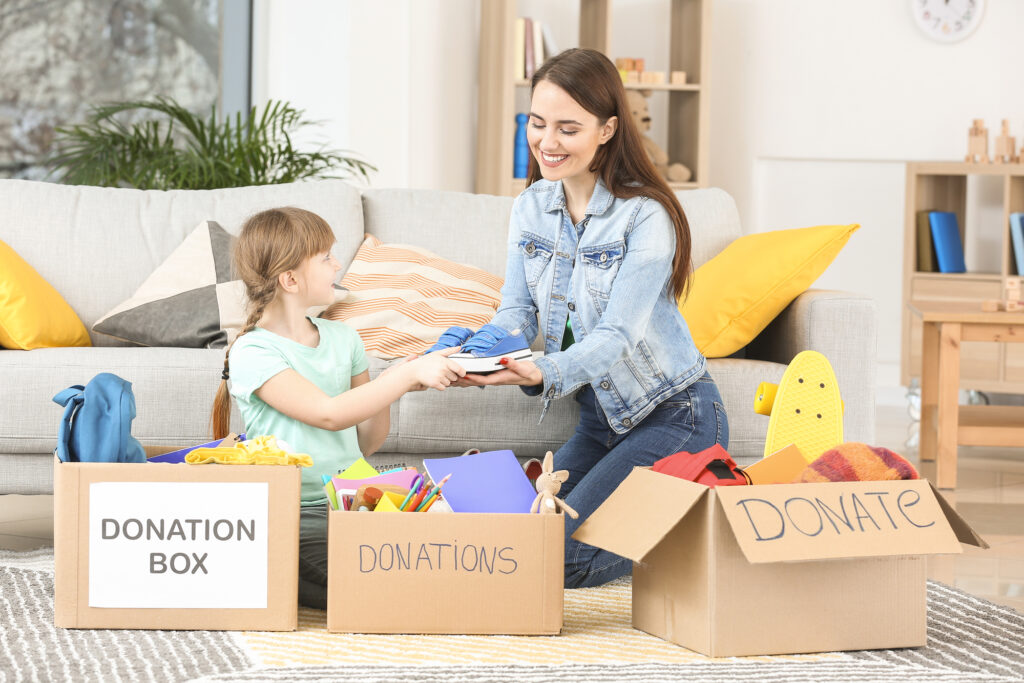
How to Declutter Kids’ Rooms in the Home with Their Help
If you have kids, you know they’re better at creating clutter than anyone. Toys are never put back into the toybox where they belong, and books and art supplies are left on tables, floors, and essentially anywhere other than where they should be kept.
Your kids may not be too happy if you start throwing their stuff away, so get them to help! By involving them in the decluttering process and asking them to help decide what stays and goes, they’ll have an easier time getting rid of things.
Here’s how to begin decluttering your kids’ rooms:
Try rotating toys.
If your kid currently has way too many toys, consider a toy rotation system.
By letting them keep a limited number of toys at any given time and holding the rest for later, you’re actually doing your child a favor and encouraging focused, creative play – and it’s a great way to cut some clutter from their room.
Find an organizational system that works.
If your kid loves crafts, or Lego, or other toys or activities that involve lots of small items to store, it’s important to find a good way to keep that stuff organized – or else it’ll quickly become clutter.
From bins and drawers to hanging solutions and more, do some research and see what might work for your child’s space.
Have them help with donating.
Decluttering can be tough for kids initially. Having them help with the donation process can make it easier for them to let go as they get to know what person or organization can make use of their things.
This can also reinforce the habit of sharing with others, which is a great thing to instill in kids.

How to Declutter the Garage & Other Storage Spaces
It can be helpful to save storage rooms and the garage until the end of the decluttering process. Often the items stored in them could feel overwhelming initially. Having worked up to this room by making decisions in other rooms first will make the process go more smoothly.
Start in one small section of the garage and complete it before moving on to the next one.
To start decluttering in your garage:
How long have you been storing this?
Start by asking yourself how long you’ve been storing these items. Garages and storage units are notorious for housing dusty boxes that haven’t been accessed in years.
If you’ve been storing things for many years without even opening the box, that tells you some things about its importance in your life.
Get realistic.
Be realistic as you make decisions about what stays and what goes from the garage. A lot of what-if and someday items tend to make their way to the garage.
Get realistic with how likely you are to repair those items that have been sitting there for years. Will you really use the leftover supplies from that DIY project you did a long time ago?
Be honest with
What are you creating space for?
Cleaning out a storage unit will not only save you money but it can also relieve a tremendous mental and emotional burden.
When you focus on your end goal and why you want to achieve it, it can help motivate you throughout the decluttering process.
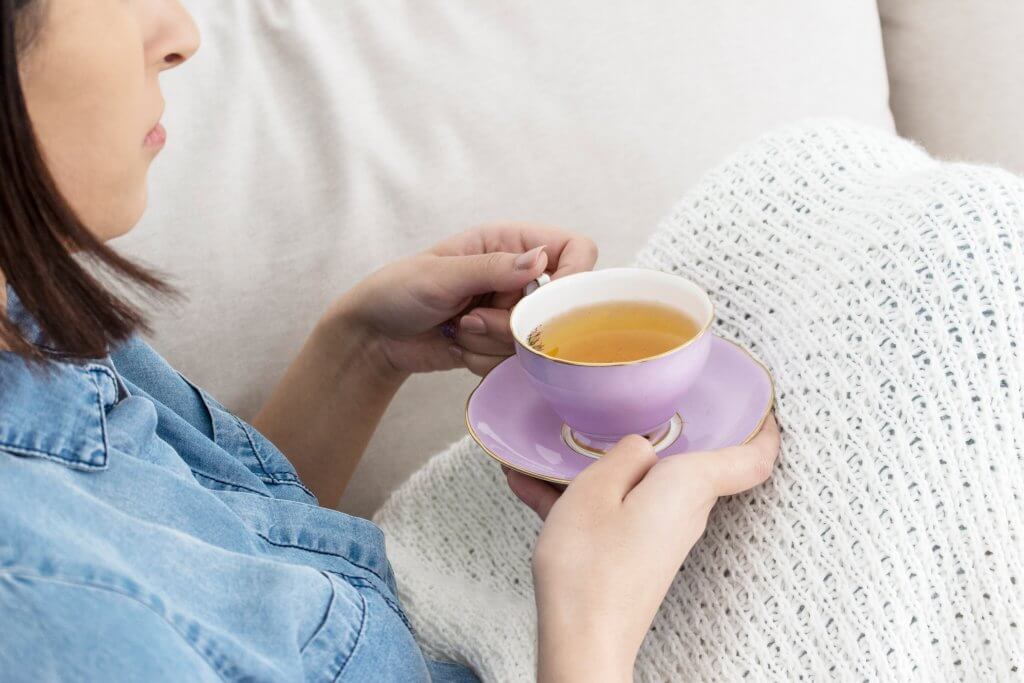
Benefits of Decluttering
Decluttering your house will have a positive impact on your mental and emotional wellbeing, but it brings other benefits, too! Here are just a few of the ways decluttering your house will benefit your life.
You’ll Save Time
The little moments you spend looking for stuff and shuffling around clutter really do add up! You’ll be surprised to see how much time you save when you live in an organized space.
Save Money
Have you ever bought something that you knew you already owned but simply couldn’t find? A tool, an appliance, a piece of clothing? That won’t happen if you live in an organized house – at least, it’ll happen a lot less!
That isn’t the only way you’ll save money. By keeping a clean and organized kitchen, you may be more inclined to cook instead of ordering delivery or takeout. And by making your home a relaxing, organized space where you actually enjoy spending time, you might save on going out.
You’ll Get Better Sleep
Trying to sleep in a cluttered place can be challenging – consciously for some people, and subconsciously for others. By decluttering and organizing your bedroom, chances are you’ll find yourself resting better at night.
You’ll Feel Less Stressed
Clutter can stress us out and make us unhappy. By eliminating that source of stress, you’ll find yourself more relaxed, in a better mood, and ready to tackle whatever life throws at you.

Decluttering can be an exciting, freeing experience!
You’ll be amazed to see just how much better life can be when you aren’t living in a cluttered space. Make a plan to declutter your house room by room, and once you start seeing the progress you’ve made, you’ll be even more motivated to keep it going!
Want more help with decluttering? Check out the decluttering products I’ve designed just for you.
Sign up on the form below to get weekly tips on simplifying and decluttering sent straight to your inbox. You’ll also get the free Decluttering Jumpstart to help you begin your decluttering journey.


First time I found this info for free, really?
I’ve read many of your ideas and have finally started the process of decluttering my hobby/junk ROOM (and I mean to empathize room) and you are correct the house does look worse now, but my problem is trying to decide what to do next. I have 10 different hobbies I enjoy very much but I am the classic “Jack of all trades and master of none”, which makes it hard to decide on the next step. I normally am a very organized individual and I want to be able to walk into my room, go right up to a specific project and pull it out to work on. I haven’t bought any containers yet, but I do have the hobbies organized into groups, but – HELP – I am at a loss as to my next step(s)!!! Any help you can give me would be greatly appreciated. Thanks, Andrea
I’m trying to set up a “creative corner” of sorts, so I would really love to hear some tips too! Trying out many hobbies is so fun. I sometimes drop them for years but then always come back to them, so I also need to be more intentional about storing it all, without taking up too much space.
A few things that already work for me:
* Empty table at all costs, if a project lies there for a few days untouched, it has to go in storage. If I want to be reminded to work on it, putting it in my planner or a post-it note is better than blocking the creative space for other projects, which I tend to forget.
* Those big, see-through, stackable containers – one for each activity. I love those for essential tools and materials I need (e.g. one for sewing has needles, threads in their own closed box, buttons etc.) – if there’s bulkier materials (like fabrics!), I’d ideally want to store them in a cabinet with shelves, I just don’t have one yet. The point is to be able to pull out one box and have everything I need to start. I guess sectioned cabinet or drawers would work too, but I find this more flexible?
Good luck with your room & creative projects!
Love this post Julianna! I have found that I go through phases where I let clutter acccumulate a little bit cause I am busy with other stuff like summer fun! But when I really stop and look at my space I can tell that it’s stressing me out and making life harder. That’s when I follow your suggestion to set a timer and clear stuff out. It’s amazing how something as simple as cleaning a desk drawer can make my whole day better! Is decluttering worth it? Definitely!
Can you provide suggestions on how I approach my hardworking adult son and his live in (albeit very dysfunctional gf) on decluttering his condo. She brought clutter into every possible living space he had and has taken over. Meanwhile, sits on sofa all day. How do I approach the issue. I frequently dog sit when they are away. Thank you.
Hi Diane. In order to maintain a good relationship with your son, I’d stay out of it unless he asks for your advice or help. It may not be a problem for him.
Just as you can help kids declutter by providing them a set storage space/container for certain items, I’ve found it helps immensely to either define my goal for a space and set a limit on storage area for a category of items. Sorting my holiday decorations was impossible until I gave myself the limit of two specific boxes it all had to fit in; suddenly deciding which items I most wanted to keep got a lot simpler. Similarly, setting a goal for my dresser of having all my everyday items consolidated to three drawers, so the last two could be used for off-season clothing. It also defines the space for those items so, as I declutter thru the rest of the house, if I find something in that category, I know exactly where it needs to go so it doesn’t just get moved to yet another “I’ll deal with it later” pile.
I have a broken kneecap and arm. I’ve had surgery waiting now for the therapy to begin. I’m inspired to declutter and begin anew once I’m back in motion. Thank you for the tips. I’m anxious to begin
70 years of multi-person household clutter and I am the one responsible for going through it all for a move in the new year. Egads! Spent an entire day gathering up every vase in the house, cleaning them, deciding which ones to keep and which to dispose of THEN tackled one kitchen cupboard. Doesn’t look like I’ve accomplished anything but it is a process and will get easier over time. My advice is to start with items of little personal attachment. Once you establish a system/routine of decluttering it will be easier to do the harder, more personal stuff later.